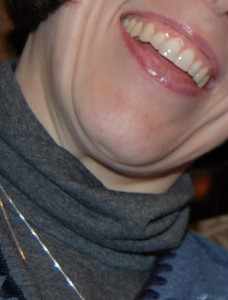I wear retainers at night.
It’s true.
I didn’t get braces until I was in my 30s, and I paid for them myself.
This makes one want to take care of one’s investment (smile).
So when the orthodontist said “braces for two years – retain for life” I took it seriously.
But last Sunday night when I reached for my retainers, one was broken. Drat!
On Monday I had to spend over an hour I didn’t have driving to the orthodontist and getting an impression and driving home on a day when grades were due and I was trying to leave town. Double drat!
Today I returned to pick up my new top retainer. I spent over an hour this time in the chair while the orthodontist made a number of adjustments. Several rounds of this until finally everything seemed to fit just right. Between rounds I read two articles and made lists.
In the end I’m glad to have the retainers back and in working order. They keep my teeth from drifting to their old preferred crooked state. And they keep me from biting the inside of my cheeks.
I’ve said before that disciplined prayer changes the body. So does the disciplined use of retainers. Today as I read Pierre Bourdieu I thought of the work that braces and retainers do as they reshape my smile.
We incorporate (take into the body) all kinds of memories, postures and gestures that do work quite apart from or despite our best thinking or rational attempts to change. Many of the practices (and wisdom) of the body happen at unconscious and preverbal levels. The way we hold ourselves and move through space entails a deep sort of “knowing” that we rarely think about or notice.
The orthodontist used the word proprioception. I know this word from my work on practices and embodied knowing, but I’ve never heard anyone use it in conversation outside of academia. What he said was when I first take out the retainers in the morning, I might not think my teeth, especially the molars at the back, are going together in the right way. This internal sense of knowing how parts of the body are related to each other is a subtle kind of knowing that gets one close to the sense of embodied wisdom that usually escapes our attention.
What he actually said was that for maybe 15 seconds my sense of proprioception might tell me that my teeth are not going together properly, but in fact, it was a trick from the night of wearing retainers, and my brain would get the self-corrected message from my body after a few seconds.
Fascinating. Whole levels of knowing the world and how we function in it are outside our awareness. Yet this embodied knowing helps us move through the world avoiding harm and making our way with seeming grace. In fact our bodies are a source of grace beyond our notice.
Gravity and time certainly take their toll on this embodied grace. And we can try to make changes to our bodies, through prayer and many other means, and then retain those changes in disciplined ways. Yet the subtlety of embodied knowing has a logic and wisdom all its own (smile).




